Wednesday, May 17, 2006
i dont know if anyone still goes on this blog, but i thought id fire this one off: the UH book store buys all books except for the hawaiian playwrites...so sell the ones you didnt particularly fancy...tis all im off have a great summer!
Thursday, May 11, 2006
Photos From A Potluck Party. Joyous!

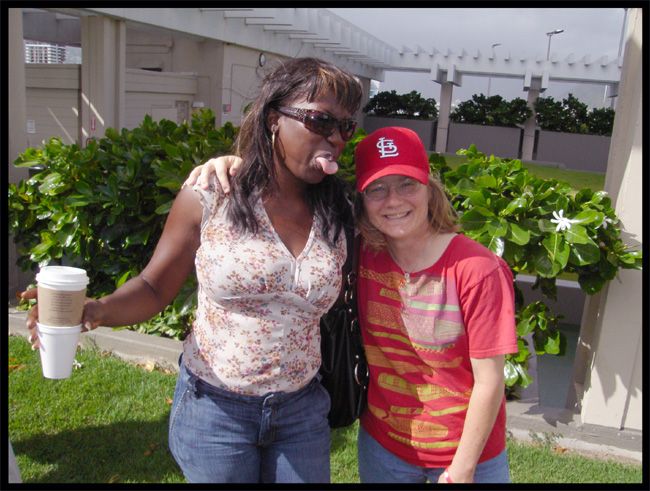
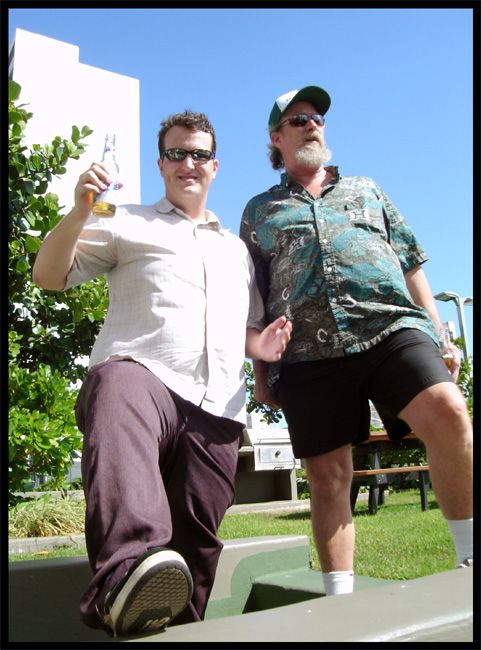



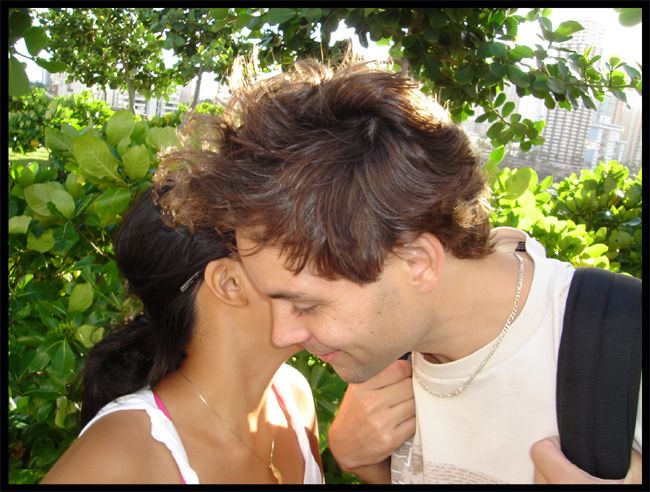

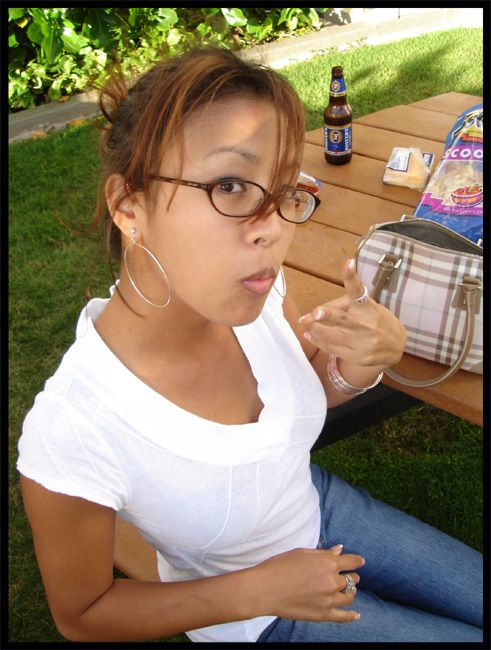

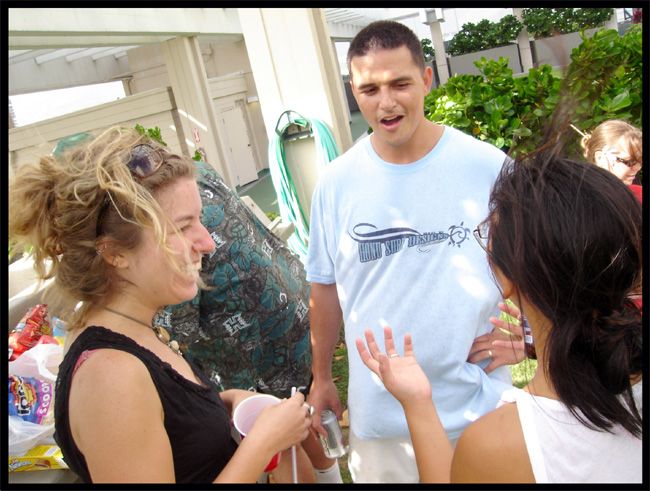
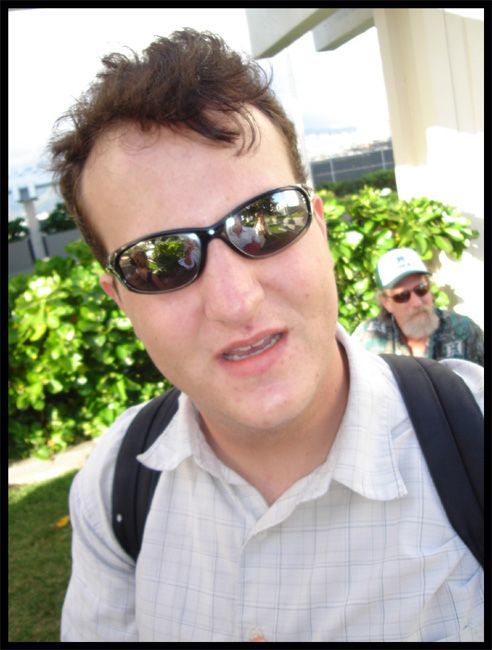

HA!
DONE! NO MORE! SPAM THE BLOG IF YOU WISH!!!
Awesome party, people. I am going to miss this class. I love you all, and I'm not even that drunk when I'm saying that. Ciao!
Awesome party, people. I am going to miss this class. I love you all, and I'm not even that drunk when I'm saying that. Ciao!
Tuesday, May 02, 2006
double-consciousness follow-up
amlit338
Thanks for posting that. Feels like hearing of my own funeral!
I wanted to say, if anyone is still listening, that Barbie doesn't have double-consciousness yet, though she could qualify in the future if she breaks through her own ignorance. She'd have double-consciousness IF she understood the dynamic by which people look at her (a woman) and expect to see a thin, blonde, creature. As she isn't yet there, I don't think she qualifies. My bad. I guess the larger point was that there are "dominant culture" expectations on almost everyone that are damaging, just more bad expectations on members of minority groups and on disenfranchised whites (West Virginia miners, for example).
aloha, sms
Thanks for posting that. Feels like hearing of my own funeral!
I wanted to say, if anyone is still listening, that Barbie doesn't have double-consciousness yet, though she could qualify in the future if she breaks through her own ignorance. She'd have double-consciousness IF she understood the dynamic by which people look at her (a woman) and expect to see a thin, blonde, creature. As she isn't yet there, I don't think she qualifies. My bad. I guess the larger point was that there are "dominant culture" expectations on almost everyone that are damaging, just more bad expectations on members of minority groups and on disenfranchised whites (West Virginia miners, for example).
aloha, sms
Potluck Party In Memory Of Professor Susan Schultz.
It’s a GO, gang!
Potluck on May 11, 2006 right after our American Literature Final Examination.
Location: Macro Polo Condominium’s Outdoor Recreational Area (aka Tim’s place).
The official start time that time has registered with security at 2:30 PM. So that gives y’all half an hour from campus for a 15-minute walk.
So where is the Macro Polo located, you may inquire? The address is 2333 Kapiolani Boulevard. Google --> Map.
Or here is a quick explanation of how to get there:
Walk down University Avenue (the main street in which UH Manoa is located on) to the very end. Make a right at the intersection and it’s the building at the next intersection. It will be on your left. It is huge; it even says “Marco Polo” at the entrance.
Or take the [A] CityExpress bus from Sinclair Circle and ride down two stops. Then walk across the street from the bus stop.
And this information for people who like driving: you will have three easy and convenient ways of parking.
1) Ala Wai Park is a safe place to park until 10 PM (and goshdarn, the potluck ain’t going to last that long, Tim the Host has Finals on Friday). The parking lot is located at the very very end of University Avenue, before the Canal. There is usually an abundance of parking. Then it’s a two minute walk away from Macro Polo.
2) Street parking. It’s a safe neighborhood. So park anywhere nearby. Isenberg Street is good if there are spaces available. Two minute walk plus the time needed to find street parking.
3) Tim has notified me that guests may park at his parking structure at the Marco Polo. The rates are 1 hour for 1 dollar. Or, if notified early enough, Tim can sponsor guests to park at the rate of 50 cents an hour.
Now since this is a potluck, please make sure you bring something to share. Tim, as the host, sponsors the fluid-free charcoal (for the barbeque pit) as well as the recreational area.
Please leave a comment on this blog entry as to what you are planning to bring, so that we will not have a dozen cartons of macaroni salad. And if I’m not mistaken, alcohol consumption is a go, according to security, as long as it does not become a scene from Old School.
Finally, there is a basketball and an open area that may be used for dodgeball. So if anyone wants to sponsor rubber balls for dodgeball or a basketball, please leave that in your comment as well.
Extra notes: Professor Schultz, you are the guest of honor, so you must show face.
And further concerns, please email me via: sauhsu [at] gmail.com
Potluck on May 11, 2006 right after our American Literature Final Examination.
Location: Macro Polo Condominium’s Outdoor Recreational Area (aka Tim’s place).
The official start time that time has registered with security at 2:30 PM. So that gives y’all half an hour from campus for a 15-minute walk.
So where is the Macro Polo located, you may inquire? The address is 2333 Kapiolani Boulevard. Google --> Map.
Or here is a quick explanation of how to get there:
Walk down University Avenue (the main street in which UH Manoa is located on) to the very end. Make a right at the intersection and it’s the building at the next intersection. It will be on your left. It is huge; it even says “Marco Polo” at the entrance.
Or take the [A] CityExpress bus from Sinclair Circle and ride down two stops. Then walk across the street from the bus stop.
1) Ala Wai Park is a safe place to park until 10 PM (and goshdarn, the potluck ain’t going to last that long, Tim the Host has Finals on Friday). The parking lot is located at the very very end of University Avenue, before the Canal. There is usually an abundance of parking. Then it’s a two minute walk away from Macro Polo.
2) Street parking. It’s a safe neighborhood. So park anywhere nearby. Isenberg Street is good if there are spaces available. Two minute walk plus the time needed to find street parking.
3) Tim has notified me that guests may park at his parking structure at the Marco Polo. The rates are 1 hour for 1 dollar. Or, if notified early enough, Tim can sponsor guests to park at the rate of 50 cents an hour.
Now since this is a potluck, please make sure you bring something to share. Tim, as the host, sponsors the fluid-free charcoal (for the barbeque pit) as well as the recreational area.
Please leave a comment on this blog entry as to what you are planning to bring, so that we will not have a dozen cartons of macaroni salad. And if I’m not mistaken, alcohol consumption is a go, according to security, as long as it does not become a scene from Old School.
Finally, there is a basketball and an open area that may be used for dodgeball. So if anyone wants to sponsor rubber balls for dodgeball or a basketball, please leave that in your comment as well.
Extra notes: Professor Schultz, you are the guest of honor, so you must show face.
And further concerns, please email me via: sauhsu [at] gmail.com
Friday, April 28, 2006
new era of protest music
Today, and today only I think, Neil Young's new album is available on-line. _Living with War_:
http://www.hyfntrak.com/neilyoung2/AFF23233/
Back in the day, he and Crosby, Stills Nash wrote some famous songs in protest against the Vietnam War. Who was writing about our coming full circle in this class?
aloha, sms
http://www.hyfntrak.com/neilyoung2/AFF23233/
Back in the day, he and Crosby, Stills Nash wrote some famous songs in protest against the Vietnam War. Who was writing about our coming full circle in this class?
aloha, sms
Thursday, April 27, 2006
blog tone
amlit338
I've had a hard time reading the tone on the blog for a long time. Are they joking, I wonder, or is there real rancor going on? I always hope the former, fear the latter. So I will say that I hope that the STFUs that have been exchanged between Sau and Stacy are not as hostile as they may seem. But I'll also add that on a space like a blog, it IS hard to read tone, so perhaps we ought to be slightly more, what?, formal, or at least more ostensibly polite in what little future we have left. I appreciate your passion, but there are ways to express passionate differences that are not nasty. Part of the lesson of this class is that we need, we must, find ways to speak to one another, despite the evident need for translation between languages and cultures.
I'm also wondering if some of our passions have been due to speaking quickly, hence without consideration of the exact wording we intend. When we speak quickly, we often don't select the right words. It's important to take care, because what is haste in one instance may prove an insult in another.
Ms. Manners
I've had a hard time reading the tone on the blog for a long time. Are they joking, I wonder, or is there real rancor going on? I always hope the former, fear the latter. So I will say that I hope that the STFUs that have been exchanged between Sau and Stacy are not as hostile as they may seem. But I'll also add that on a space like a blog, it IS hard to read tone, so perhaps we ought to be slightly more, what?, formal, or at least more ostensibly polite in what little future we have left. I appreciate your passion, but there are ways to express passionate differences that are not nasty. Part of the lesson of this class is that we need, we must, find ways to speak to one another, despite the evident need for translation between languages and cultures.
I'm also wondering if some of our passions have been due to speaking quickly, hence without consideration of the exact wording we intend. When we speak quickly, we often don't select the right words. It's important to take care, because what is haste in one instance may prove an insult in another.
Ms. Manners
Poeta en San Fransico Discussions - April 27, 2006
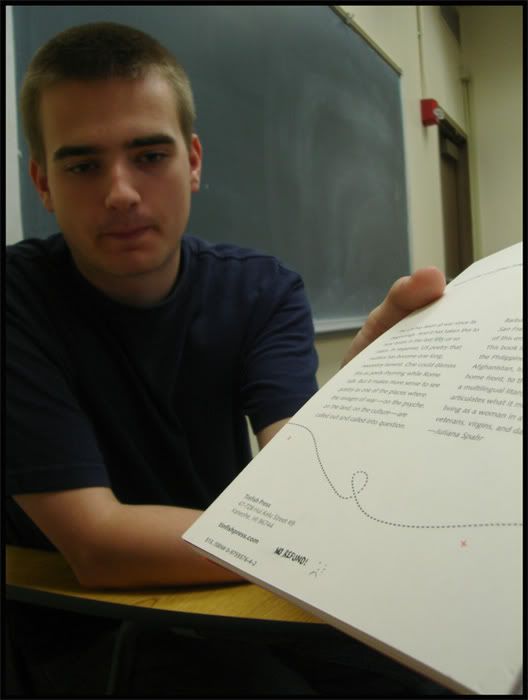
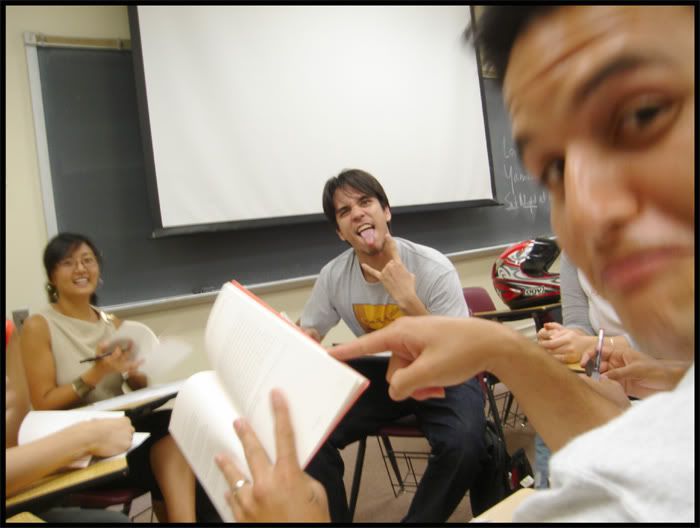
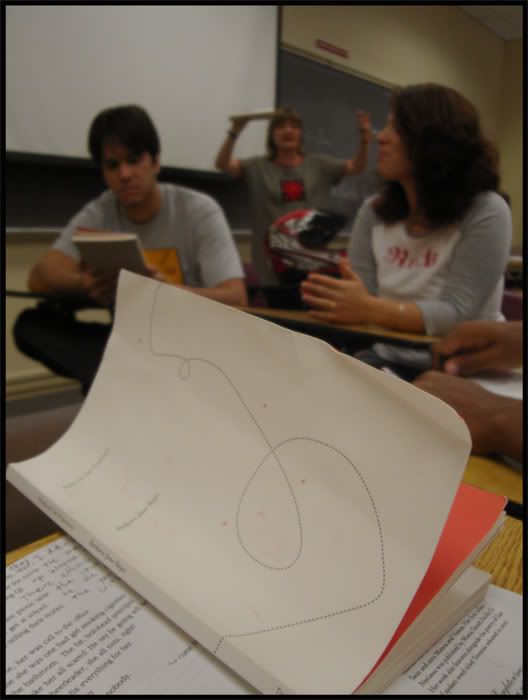
My last attempt at sounding intelligent
Last blog post. It's a sad day for Amlit 338.
I wanted to continue the discussion we were having on Tuesday. I think that all the different opinions that people had were correct. I don't think that including the foreign languages was for any one reason but for a number of them. It isn't necessary for us to know what the other languages says to get the overall meaning of the book but including it does a number of things.
For starters it ties in with the whole colonialism aspect of the book. What better was to say what colonialism does than to include a language that from what I learned on Tuesday is all but dead? From the information about it making a comeback in tattoos and what not it sounds like it may pull a Hawaiian and make resurgence as the people there try and reclaim their heritage/culture.
I also think she included it because it adds more mystery to her poetry. If people want to look it up they can and get a little extra meaning out of it while the people who could care less don't necessarily have to look it up but I think those that do want to are forced to look deeper than just a dictionary. Poetry is mystery in its own right as the language of "What in the hell is this person trying to say?" and including something that no amount of analysis with the book can uncover is adding another layer to her book. All we could interpret was that the one language that I forgot the name of corresponded with the other language in terms of sentence length and structure.
I think she included the different languages to show how the main topics of her book, war, colonialism, and the violence that comes along with them, force the world closer together. It reminds us that not everyone speaks the same language and that we should respect other cultures.
I wanted to continue the discussion we were having on Tuesday. I think that all the different opinions that people had were correct. I don't think that including the foreign languages was for any one reason but for a number of them. It isn't necessary for us to know what the other languages says to get the overall meaning of the book but including it does a number of things.
For starters it ties in with the whole colonialism aspect of the book. What better was to say what colonialism does than to include a language that from what I learned on Tuesday is all but dead? From the information about it making a comeback in tattoos and what not it sounds like it may pull a Hawaiian and make resurgence as the people there try and reclaim their heritage/culture.
I also think she included it because it adds more mystery to her poetry. If people want to look it up they can and get a little extra meaning out of it while the people who could care less don't necessarily have to look it up but I think those that do want to are forced to look deeper than just a dictionary. Poetry is mystery in its own right as the language of "What in the hell is this person trying to say?" and including something that no amount of analysis with the book can uncover is adding another layer to her book. All we could interpret was that the one language that I forgot the name of corresponded with the other language in terms of sentence length and structure.
I think she included the different languages to show how the main topics of her book, war, colonialism, and the violence that comes along with them, force the world closer together. It reminds us that not everyone speaks the same language and that we should respect other cultures.
more responses from BJR
on her blog:
http://poetaensanfrancisco.blog-city.com/poeta_post_for_susan_and_her_students_2.htm
aloha, sms
http://poetaensanfrancisco.blog-city.com/poeta_post_for_susan_and_her_students_2.htm
aloha, sms
For josh.
The point of the pps. boyfriend comment is that he's white and I'm asian and I'm completely fine with that.
the end.
amlit338
the end.
amlit338
Whoah there buzzkill!
I'm not even going to approach the subject of why she used different languages in her poetry, because, when I wrote poetry in Eng313, I used Spanish as well. I didn't do it to be elitist, but I did it because I think Spanish is a beautiful language and it is a part of me now. (and it is spoken in the place I was born)
So, what I am going to approach is modern poetry in general. Modern poetry. Hmm. I really want to know: Does all poetry today have to have some political message? Does it always have to be on horrifying subjects and depressing topics? Human trafficking, Asian Fetishes, War, Nuclear tests, The Best Minds of your hippy generation being wasted. Dia De la Muerte, more War. It seems the majority of the poetry I have been assigned to read while at UH, excluding Sappho, is either talking about a people wronged, or an individual person's suffering. What the hell happened to love poetry? What happened to poetry about.. GOOD STUFF HAPPENING IN YOUR LIFE?! I don't mean to complain, because that makes me a hypocrite for what I am about to say, but it seems all the poetry I read is someone COMPLAINING about how shitty their world is. Yes, I know the world can be a horrific place, but not everyone is suffering. Are the only ones inspired to write poetry... the ones that are suffering?
I guess I don't have much to say about the book in particular. There don't seem to be too many happy poems in it. I guess I wouldn't be too happy either, if I were a poet. I hear it doesn't pay very well. :-P LOL
So, what I am going to approach is modern poetry in general. Modern poetry. Hmm. I really want to know: Does all poetry today have to have some political message? Does it always have to be on horrifying subjects and depressing topics? Human trafficking, Asian Fetishes, War, Nuclear tests, The Best Minds of your hippy generation being wasted. Dia De la Muerte, more War. It seems the majority of the poetry I have been assigned to read while at UH, excluding Sappho, is either talking about a people wronged, or an individual person's suffering. What the hell happened to love poetry? What happened to poetry about.. GOOD STUFF HAPPENING IN YOUR LIFE?! I don't mean to complain, because that makes me a hypocrite for what I am about to say, but it seems all the poetry I read is someone COMPLAINING about how shitty their world is. Yes, I know the world can be a horrific place, but not everyone is suffering. Are the only ones inspired to write poetry... the ones that are suffering?
I guess I don't have much to say about the book in particular. There don't seem to be too many happy poems in it. I guess I wouldn't be too happy either, if I were a poet. I hear it doesn't pay very well. :-P LOL
To be elitist or not to be elitist...isn't quite the question I was trying to ask the other day but it was misconstrued and people almost died. sorry.
I will admit, my "elitist" comment was a bit of me playing devil's advocate. But, while I understand why there is the use of multiple languages and this and that and blah blah blah...In truth, I just wasn't impressed by BJR.
The sad thing is, within the first, ten pages or so, I DID like BJR. But then by the 20, 30, 50th page...I just wanted some damn puncuation.
But, that's just me and my own preferences. I'm sure the majority of englishtagalogbabayin speaking people LOVE that there's no puncuation. It's making a statement--or something like that.
It's good imagery, it's a good topic, it's good in a lot of ways, it just wasn't GREAT. Which brings me back to my "elitist" comment.
I think the reason I felt compelled to say that perhaps she's being elitist, was because, there is something great here. There is a great message that BJR is trying to convey, get across, hit you in the face with--BUT--she doesn't quite do it. And because she just misses the "something great written by someone who really wants to make a difference for the literary world as a WHOLE" mark, it feels more like it's in the "something good that an elitist wrote" category.
So--I guess my comment wasn't meant to say "YES! BJR is an elitist"...it was just meant to say, "You know, BJR is coming across a little elitist."
Okay?
okay.
amlit338
ps. i really hate that "william blake" comment.
pps. my boyfriend is irish/french.
The sad thing is, within the first, ten pages or so, I DID like BJR. But then by the 20, 30, 50th page...I just wanted some damn puncuation.
But, that's just me and my own preferences. I'm sure the majority of englishtagalogbabayin speaking people LOVE that there's no puncuation. It's making a statement--or something like that.
It's good imagery, it's a good topic, it's good in a lot of ways, it just wasn't GREAT. Which brings me back to my "elitist" comment.
I think the reason I felt compelled to say that perhaps she's being elitist, was because, there is something great here. There is a great message that BJR is trying to convey, get across, hit you in the face with--BUT--she doesn't quite do it. And because she just misses the "something great written by someone who really wants to make a difference for the literary world as a WHOLE" mark, it feels more like it's in the "something good that an elitist wrote" category.
So--I guess my comment wasn't meant to say "YES! BJR is an elitist"...it was just meant to say, "You know, BJR is coming across a little elitist."
Okay?
okay.
amlit338
ps. i really hate that "william blake" comment.
pps. my boyfriend is irish/french.
Wednesday, April 26, 2006
"In Colleges, He is found in Asian Studies Courses, Learning an Asian Language."
You know what I am really tired about? People raising their voices in a small classroom.
Unless you are the professor, have something witty to say like A.J., or you are the dedicated facilitator of class discussions: STFU
That being said, I found Tuesday’s discussion —prompted by Andy and Jen (props!)— to be an very important in our understanding of American Literature.
Because how better to understand American Literature then with a book of poetry complete with Tagalog and Baybayin languages?
I think Andrea said it the best when she said that the purpose was to give readers the “push back” of being exposed to a foreign language. Because I, as several of my classmates, felt that a glossary was imminent to Poeta en San Francisco. And I think that Andrea brought up a strong argument of why it did not.
But on the topic of elitism and whether or not Barbara Jane Reyes is an elitist poet, I would have to say “yes.” Before the flame wars begin, let me explain my position.
It is my opinion that any writer –poets in particular— write their works with a certain hint of snobbery. Every person’s writing is a small memoir of her or his own life experiences. And since only the writer of piece may have lived the shoes of herself or himself, it will always be evident that no reader will completely understand the writing.
Heck, I could say that this blog entry has my own form of elitist pretentiousness.
But I guess the point of poetry is not for us to understand its meaning. As Ashley said in her blog post: “although we may lose the content of the poem that is written in another language, we do not lose the feeling/emotion.” And I am reminded of Yusef Komunyakaa, whose poems have a lot of feeling and emotion. Likewise, none of us can ever fully understand Komunyakaa’s poetry because we were not there – not even close, since most of parents probably weren’t even dating when the Vietnam War happened.
I will note that I understood most of page 84. Maybe because of my own resentment towards every documentary I have ever seen in college that featured old Caucasian men as “experts in so and so Asian culture.”
And I probably did grasp page 84 (I reckon I cannot title the poem since its “one continuous poem”) more so then any other page in Poeta en San Francisco. Maybe it was the only poem written in plain-speak. And very non-stereotypically poem-like.
Which brings me to the question, why in the world does page 84 even take place?
It is uncharacteristic compared to the rest of book. But bloody heck, did I take to it!
Also, is this the last required weekly blog entry? Or can there be more blogging for extra credit…*fingers crossed*
Unless you are the professor, have something witty to say like A.J., or you are the dedicated facilitator of class discussions: STFU
That being said, I found Tuesday’s discussion —prompted by Andy and Jen (props!)— to be an very important in our understanding of American Literature.
Because how better to understand American Literature then with a book of poetry complete with Tagalog and Baybayin languages?
I think Andrea said it the best when she said that the purpose was to give readers the “push back” of being exposed to a foreign language. Because I, as several of my classmates, felt that a glossary was imminent to Poeta en San Francisco. And I think that Andrea brought up a strong argument of why it did not.
But on the topic of elitism and whether or not Barbara Jane Reyes is an elitist poet, I would have to say “yes.” Before the flame wars begin, let me explain my position.
It is my opinion that any writer –poets in particular— write their works with a certain hint of snobbery. Every person’s writing is a small memoir of her or his own life experiences. And since only the writer of piece may have lived the shoes of herself or himself, it will always be evident that no reader will completely understand the writing.
Heck, I could say that this blog entry has my own form of elitist pretentiousness.
But I guess the point of poetry is not for us to understand its meaning. As Ashley said in her blog post: “although we may lose the content of the poem that is written in another language, we do not lose the feeling/emotion.” And I am reminded of Yusef Komunyakaa, whose poems have a lot of feeling and emotion. Likewise, none of us can ever fully understand Komunyakaa’s poetry because we were not there – not even close, since most of parents probably weren’t even dating when the Vietnam War happened.
I will note that I understood most of page 84. Maybe because of my own resentment towards every documentary I have ever seen in college that featured old Caucasian men as “experts in so and so Asian culture.”
And I probably did grasp page 84 (I reckon I cannot title the poem since its “one continuous poem”) more so then any other page in Poeta en San Francisco. Maybe it was the only poem written in plain-speak. And very non-stereotypically poem-like.
Which brings me to the question, why in the world does page 84 even take place?
It is uncharacteristic compared to the rest of book. But bloody heck, did I take to it!
Also, is this the last required weekly blog entry? Or can there be more blogging for extra credit…*fingers crossed*
Tuesday, April 25, 2006
note on glossing from sms
amlit338
An afterthought from class. I can well understand the desire to have a glossary and thus to better understand what's going on. I read poetry in translation, if only so I can get the sense, if not the music of the poem. But my experience with glossaries is that they're as often _un_helpful as helpful. Unless you write long narratives to explain cultural context, you're back where you started. Cathy Song's first book about Hawai`i had a gloss at the back. There were entries like "Waialua: town in central Oahu." Well, how does that help someone who knows nothing about the history of plantations in Hawai`i? Waialua was a plantation town, and the book is, in large part, about life on the plantation. So the honesty of presenting words that cannot be easily assimilated (I use this word consciously) is good, I think. The fact that we do not understand aspects of others' cultures is a significant part of understanding our world. Paradoxical as it seems.
Thanks for the conversation today. I hope Stacy didn't put out her back. And sorry about the dinosaurs, Sau. I simply couldn't help myself.
aloha, Susan
An afterthought from class. I can well understand the desire to have a glossary and thus to better understand what's going on. I read poetry in translation, if only so I can get the sense, if not the music of the poem. But my experience with glossaries is that they're as often _un_helpful as helpful. Unless you write long narratives to explain cultural context, you're back where you started. Cathy Song's first book about Hawai`i had a gloss at the back. There were entries like "Waialua: town in central Oahu." Well, how does that help someone who knows nothing about the history of plantations in Hawai`i? Waialua was a plantation town, and the book is, in large part, about life on the plantation. So the honesty of presenting words that cannot be easily assimilated (I use this word consciously) is good, I think. The fact that we do not understand aspects of others' cultures is a significant part of understanding our world. Paradoxical as it seems.
Thanks for the conversation today. I hope Stacy didn't put out her back. And sorry about the dinosaurs, Sau. I simply couldn't help myself.
aloha, Susan
questions for BJR
amlit338
Feel free to answer what you wish, BJR. These are questions everyone came up with this morning in class.
--What do you hope the reader of the book will walk away with? Is the message different, depending on who reads it (Filipino or non-Filipino readers)?
--Has living in San Francisco been a necessary ingredient to writing this book (title aside)? Could you have written an equally effective poem had you lived elsewhere (Hawai`i, Oregon...)?
--Why did you choose not to include a glossary or footnotes to the languages most of your readers will not understand?
--When did you realize you wanted to write poetry on this subject?
--How many places have you lived and from which have you gained the most, emotionally, physically, intellectually?
--Why is the book split into different sections?
--Is there a reason why you switch languages when you do? Is there an inside joke/theme/thought you want some readers to understand (by using their native language) and others not?
--How long did it take from conception to publication of the poem?
--What is your personal editing process?
--Who is the "love" in the "dear love" poems?
--Are you fluent in all the languages you use?
--Could you walk us through at least one of the Babayin and Tagalog sections?
--How did you learn Babayan and how are those sections related to the Tagalog on the same page?
thanks in advance.
aloha, SUsan
Feel free to answer what you wish, BJR. These are questions everyone came up with this morning in class.
--What do you hope the reader of the book will walk away with? Is the message different, depending on who reads it (Filipino or non-Filipino readers)?
--Has living in San Francisco been a necessary ingredient to writing this book (title aside)? Could you have written an equally effective poem had you lived elsewhere (Hawai`i, Oregon...)?
--Why did you choose not to include a glossary or footnotes to the languages most of your readers will not understand?
--When did you realize you wanted to write poetry on this subject?
--How many places have you lived and from which have you gained the most, emotionally, physically, intellectually?
--Why is the book split into different sections?
--Is there a reason why you switch languages when you do? Is there an inside joke/theme/thought you want some readers to understand (by using their native language) and others not?
--How long did it take from conception to publication of the poem?
--What is your personal editing process?
--Who is the "love" in the "dear love" poems?
--Are you fluent in all the languages you use?
--Could you walk us through at least one of the Babayin and Tagalog sections?
--How did you learn Babayan and how are those sections related to the Tagalog on the same page?
thanks in advance.
aloha, SUsan
amlit338
This is definitely a bit late. I love how BJB draws from so many different wells of influence to construct her poem. Though different sections have different feels, the poem has a cohesive feel. I especially love the going in and out of the Spanish and Filipino languages. The poem is visceral and the pious, religious feel in the backdrop give it a twisted feeling. I haven't finished it yet, so I'm not going to start prescribing meaning yet.
